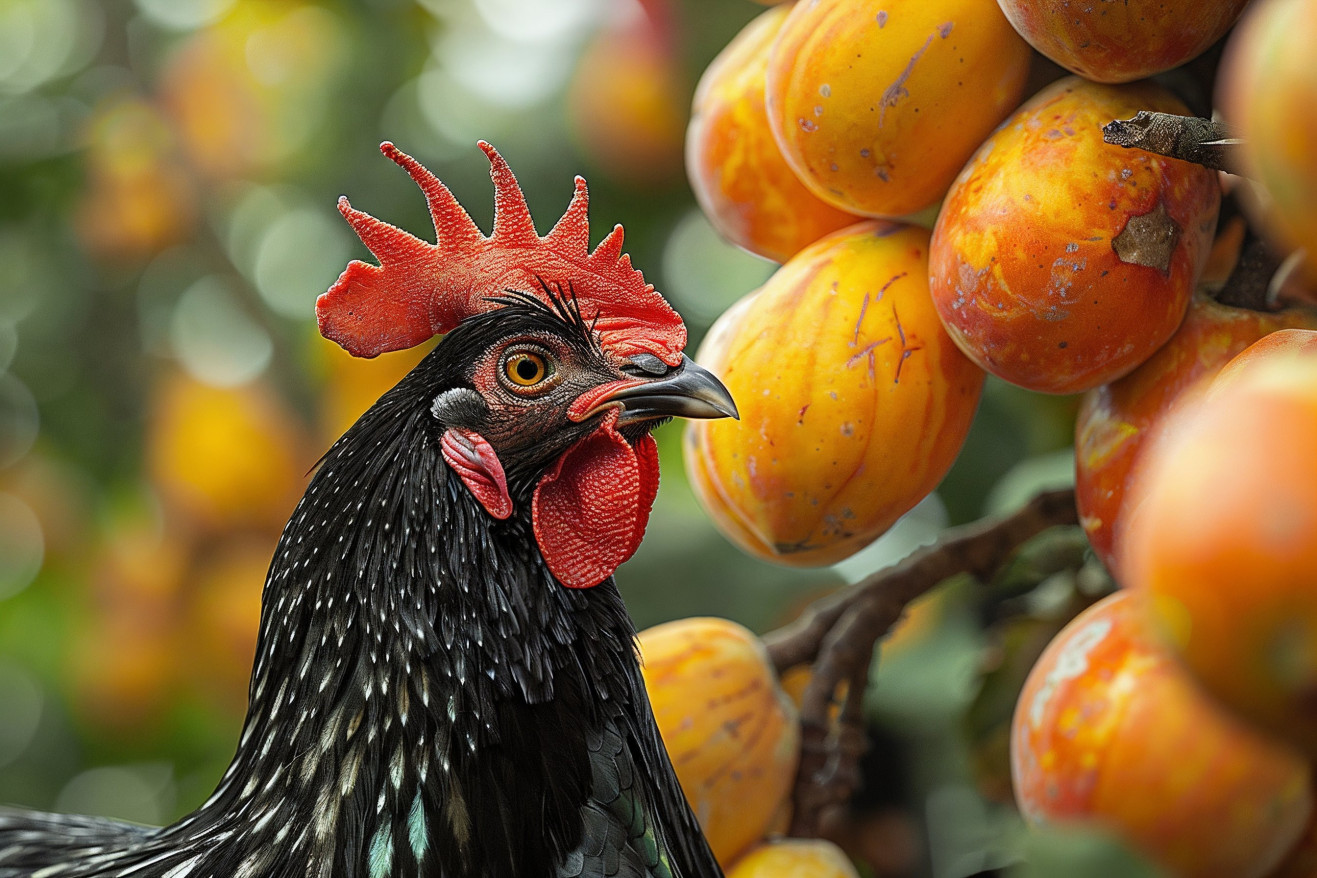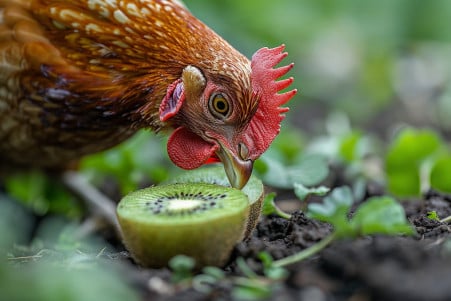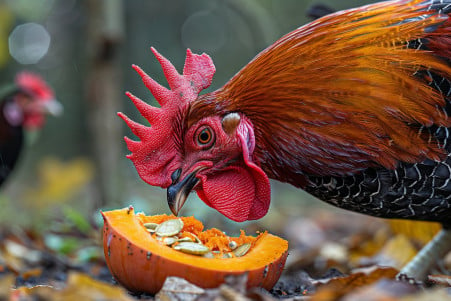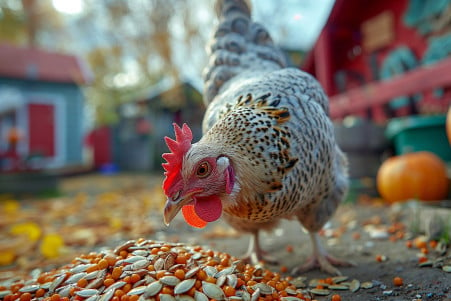Can Chickens Eat Papaya? Benefits and Risks Explained
4 June 2024 • Updated 4 June 2024

If you have chickens and want to give them some fresh, nutritious fruit as a treat, you may be wondering if papaya is a good option. Chickens can eat papaya and there are several potential benefits and risks to consider. On one hand, papaya is a good source of vitamins A and C, and it also contains antioxidants that can help your chickens stay healthy. On the other hand, the seeds and skin can be harmful to chickens, causing digestive issues. When feeding papaya to chickens, it's best to start with small amounts and make sure it doesn't account for more than 10% of their daily food intake.
While people who grow papayas at home and backyard chicken enthusiasts may be curious about the nutritional value of feeding papayas to their chickens, the research is clear. This article will cover research from poultry science and avian nutrition on the nutritional composition of papayas and their impact on chickens when included in their diet. This will help you decide whether or not to feed this tropical fruit to your chickens.
Can chickens eat papaya?
Nutritional Profile: Papaya as a Superfood for Chickens
Papaya is a superfood that is packed with nutrients that can offer a number of health benefits to chickens. The fruit is high in vitamins A and C, both of which are important for immune function and overall health in chickens. According to research cited by Bitchin' Chickens, papaya is especially high in these essential vitamins.
Papaya is also a good source of folate, calcium, and fiber, according to the Happy Chicken Coop, all of which are important for different aspects of chicken health and well-being. In addition, papaya contains the enzyme papain, which studies referenced by Poultry DVM say can help with digestion and nutrient absorption.
The fruit is also high in antioxidants, including carotenoids and flavonoids, which can help protect chickens from oxidative stress and disease, according to the Bitchin' Chickens article. By feeding chickens papaya, you can give them a nutritional leg up and help them in a number of ways.
Papaya Seeds: A Powerful Poultry Feed Additive
Papaya seeds are a rich source of protein, essential amino acids, and healthy lipids that can help chickens. A review published in the PMC notes that papaya seeds contain 24-30% crude protein and approximately 47% essential amino acids, making them a high-quality protein feedstuff for poultry.
Research has demonstrated that papaya seeds can be used as an alternative to antibiotics in poultry feed by acting as a natural growth promoter. The PMC review explains that papaya seeds have antimicrobial, antiparasitic, antioxidant, and immunomodulatory effects that can help improve chicken health.
Adding papaya seeds to the diet has also been shown to improve egg production, egg quality, and overall performance in laying hens. A PMC study found that layer chickens that were given 0.5-1.5% papaya seed as a phytogenic feed additive had significantly better egg production, egg mass, and feed conversion.
The study notes that the best inclusion levels of papaya seeds in chicken feed are between 0.5% and 1.5% depending on the age and production stage of the chickens. This demonstrates that poultry producers can help improve chicken health and performance without antibiotics by taking advantage of the nutritional and functional properties of papaya seeds.
Papaya Leaves: A Possible Additive for Broiler Chickens
Papaya leaves are rich in vitamins, enzymes, and phytochemicals that may enhance nutrient digestibility and absorption in chickens. A study published in IOP Science reported that papaya leaves are a good source of vitamins C and E and enzymes like chymopapain, papain, and lipase, which can break down complex molecules and improve nutrient absorption.
Studies have investigated the impact of adding papaya leaf flour or meal to broiler chicken diets at different concentrations. Although the findings have been inconsistent, the IOP Science study indicated that up to 9% papaya leaf flour can be added to broiler diets without reducing their performance.
In addition to improving nutrient digestibility and absorption, papaya leaves may have other properties, including antimicrobial and antioxidant effects, that could improve broiler growth and well-being. However, more research is necessary to determine the best concentrations and potential benefits of using papaya leaves as a feed additive for broilers.
How to Prepare and Feed Papaya to Chickens
When feeding papaya to chickens, it's important to select ripe, orange fruits and remove the skin, seeds, and stems. According to MrAnimal Farm, unripe or green papayas should be avoided because they have higher levels of the enzyme papain, which can damage a chicken's esophagus.
Papaya can be cut into small cubes or pieces and served fresh as a treat or mixed into a fruit salad for chickens. The Happy Chicken Coop suggests that for adult chickens, 2-3 cubes of diced papaya flesh can be given 2-3 times a week, and 1-2 teaspoons of crushed dried papaya seeds can be given 2-4 times a week. For chicks, smaller amounts are recommended, such as 1 tablespoon of diced papaya flesh and 1/4-1/2 teaspoon of crushed seeds 2-3 times a week.
Introduce papaya to the diet slowly and watch for any negative reactions or digestive problems. As mentioned by Chickens and You, it's important to feed papaya in moderation because overconsumption can lead to dietary imbalances. Papaya should make up no more than 10% of a chicken's daily food intake.
Potential Dangers and Moderation: Keeping Chickens Healthy
While papaya can be a healthy addition to a chicken's diet, it's important to use it in moderation to avoid potential dangers and nutritional imbalances. According to BackYard Chickens, chickens will eat the papaya seeds first, but these seeds can be a choking hazard and should be crushed or ground before feeding.
Feeding chickens too much papaya or allowing it to become a staple of their diet can lead to digestive upset, nutritional deficiencies, or other health issues. As mentioned by Chicken Spring, treats like papaya should make up no more than 10% of a chicken's daily diet, with the rest of the diet consisting of a nutritionally complete and balanced chicken feed.
In addition, it's important to avoid feeding chickens unripe or green papayas since these contain more papain, an enzyme that can damage a chicken's esophagus, according to BackYard Chickens. As with any new food or supplement, it's important to introduce papaya to chickens slowly and watch for any negative symptoms or changes in their health, behavior, or well-being.
Conclusion: Papaya Can Be a Healthy and Useful Addition to a Chicken's Diet
Papaya can be a useful addition to a chicken's diet, providing a variety of essential nutrients, antioxidants, and functional compounds. The fruit, seeds, and leaves of the papaya plant all have different properties that can benefit chicken health, productivity, and well-being.
That said, it's important to use papaya in moderation and to prepare it properly to avoid potential downsides. By sticking to the research-based guidelines and recommendations, chicken owners can reap the rewards of this versatile and nutritious tropical fruit. As with any dietary change, it's important to keep a close eye on the chickens and make any necessary adjustments to ensure their well-being.


